Another two weeks have gone by very quickly. Life is beginning to resume it’s usual rhythm and regularity that comes with the familiarity of a place, although each day presents itself with some kind of captivating encounter worth noting. I shall try and be more diligent at this.
Week two in the Caribbean and I was rostered to Croix des Bouquets, a one hour (but 20km) journey to one of Plan’s regional offices. Here I was to work with Frédérique and Joujoue on our Gender Equality Awareness training program. The thrill of the drive to work is yet to subside and I am still amazed that we arrive each morning sans accident, everyone else completely unfazed by this mundane proceeding. Unfortunately, taking pictures on the drive is not advised, not only does it attract potential bandits (who are known to open doors and snatch bags/people), but it is also widely disapproved of by many locals and particularly the police. What I wish I could capture better is the organised chaos of the public transport system here that is the tap tap system.
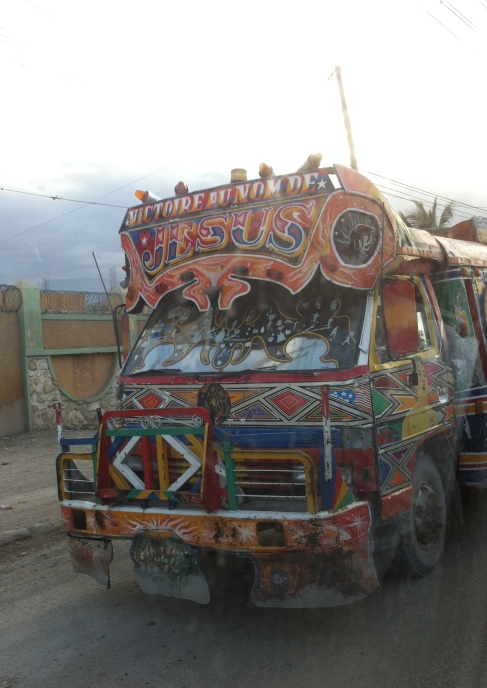 Grand Taptap: Victoire au nom de Jesus – victory in the name of Jesus
Grand Taptap: Victoire au nom de Jesus – victory in the name of Jesus
This was the best I could do, it is a large tap tap, the most common method of transport for all Haitians. No designated stopping places. Just a tap on the roof or a wave of your hand, and the hop on hop off journey continues after the exchange of a floppy (and filthy) 50 gourde note (US$1). Business is good if you have a well-decorated vehicle, I am told by my driver (this also includes large sound systems, streamers and bells). It is probably the most colourful aspect of the Haitian streets. Apart from the hand-painted shop signs, lotto numbers (gambling is rife in the city), advertising banners and plastic ware over-filled with produce and perched atop the heads of pedestrians, the city sports a kind of drab grey ambiance. Buildings remain largely unpainted, due to the cost of imported American paint, and rubble still surrounds houses and roads after the earthquake in 2010. Tap taps hence stand against this drab backdrop.
There is always a religious element to every painted people mover which also entices prospective travellers. Today I was talking to a national who gave me a simple insight into the popularity of both Christianity and the west-African voodoo that is also practiced by many. “People in Haiti think that their poverty is a punishment from god, so they pray more, they pray that Haiti will no longer be punished by Him.” I have since moved from the house with John, the country director, and am now living in a guest house that is more amongst the people you could say (directly below the house is a shanty town). It is also a stone’s throw from the Catholic Church, so every Sunday I wake to the passionate voices of a packed congregation singing traditional hymns imbued with rhythmic bongo drums and other percussion instruments. Religion features frequently in daily speech, as often tacked on to the end of a sentence will be, “dieu voulant” (god willing) ou “grâce à dieue” (thanks be to god). It is a remarkably ardent faith in Haiti, an interesting contrast to the steep decline in religion in Australia and most other developing nations.
Each Saturday morning at 7:30 I meet with an energetic group of expats at the Hotel Kinam; one of the few gingerbread style buildings that survived the earthquake in 2010, a relic of an era when Haiti had a bustling tourism industry. Wealthy politicians, foreign aid workers comprise the majority of guests to the tired and wistful establishment. We head up the mountains that Port-au-Prince sits at the foot of. This is the safest place for us to run; as all of us work for NGOs we are subject to very strict security measures. Walking along in the streets of Port au Prince is forbidden, unless you are directly heading to your compound or chosen restaurant, where your driver will always wait to see you have gone inside and met your company before leaving. So it is a fabulous feeling to get out into the open air and move my cramped-up office limbs.
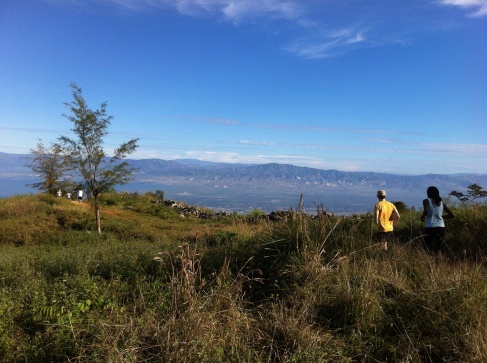 The mountains behind Port au Prince are spectacular. The country is largely mountainous, the highest peaks reaching around 2000km. Affectionately named ‘La Swisse d’Haïti’ (The Switzerland of Haiti), the view certainly does resemble the European Alps. The weekend before last I had the privilege to be taken beyond the sprawl of the city to a rural picnic with some friends I have met through a wine and cheese book club. Every Friday I go to ‘T wine’ (petit wine, in Creole) in a quaint little library at the Petionville Club: another establishment failing to mask it’s nostalgia, but with such character the likes of which could fill a Graham Green novel (both the people and the place!). 30 or so of us drove the 2 and a bit hours up the winding track (which looked more like a river bed at times!) to spectacular views and cooler weather. Sadly, upon close inspection, a melancholic hue exuded itself as the devastating environmental impacts of a land poorly managed for nearly 200 years became apparent. The steep valleys and ridges are stripped bare of the once large pines and tropical jungles as they were deforested for use (as continue to be) as fuel. There are naked swathes of earth where land slides occur on the unprotected soil after high rainfall. Underfed live stock are few and far between, and the legumes and grains produced do not nearly support Haiti’s 8 million inhabitants.
The mountains behind Port au Prince are spectacular. The country is largely mountainous, the highest peaks reaching around 2000km. Affectionately named ‘La Swisse d’Haïti’ (The Switzerland of Haiti), the view certainly does resemble the European Alps. The weekend before last I had the privilege to be taken beyond the sprawl of the city to a rural picnic with some friends I have met through a wine and cheese book club. Every Friday I go to ‘T wine’ (petit wine, in Creole) in a quaint little library at the Petionville Club: another establishment failing to mask it’s nostalgia, but with such character the likes of which could fill a Graham Green novel (both the people and the place!). 30 or so of us drove the 2 and a bit hours up the winding track (which looked more like a river bed at times!) to spectacular views and cooler weather. Sadly, upon close inspection, a melancholic hue exuded itself as the devastating environmental impacts of a land poorly managed for nearly 200 years became apparent. The steep valleys and ridges are stripped bare of the once large pines and tropical jungles as they were deforested for use (as continue to be) as fuel. There are naked swathes of earth where land slides occur on the unprotected soil after high rainfall. Underfed live stock are few and far between, and the legumes and grains produced do not nearly support Haiti’s 8 million inhabitants.
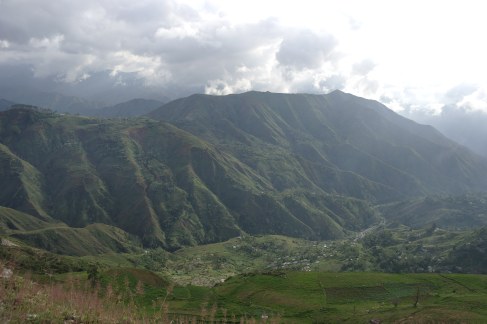
That aside, it was stirring to be welcomed with such optimism and enthusiasm by some rural Haitians I was lucky to meet, a favourite amongst them, Saint Juste and his trusty steed Caramel.
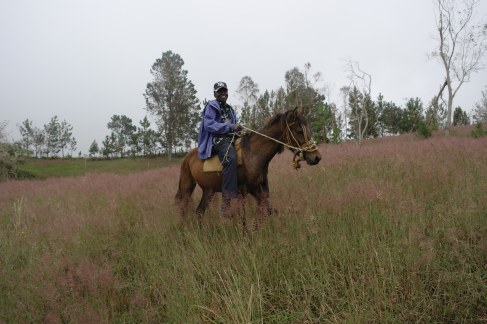 The past two weeks at work have been busy. We have finalised the dates for our training days for our staff in all of the offices which will take place in January and February. The training days are interactive sessions for all members of the office staff and provide a valuable service to the community through the trickle down effect of their teachings. Last week I attended a Child Protection Training seminar for two days which was a valuable insight into how the sessions run and the extent to which staff are familiar with Plan’s Human Rights focused Development work. It was certainly an eye opener when the instructor was asked to explain to one olderman what a condom was and it’s use. Gender Stereotyping will certainly be an interesting topic for our training – with no doubt many heated discussions to come! A dose of cultural relativism helped when I laughed to myself at the instructor’s need to use a whistle to diffuse the vehement group discussions in response to oen of his questions! A sports whistle is on my shopping list!
The past two weeks at work have been busy. We have finalised the dates for our training days for our staff in all of the offices which will take place in January and February. The training days are interactive sessions for all members of the office staff and provide a valuable service to the community through the trickle down effect of their teachings. Last week I attended a Child Protection Training seminar for two days which was a valuable insight into how the sessions run and the extent to which staff are familiar with Plan’s Human Rights focused Development work. It was certainly an eye opener when the instructor was asked to explain to one olderman what a condom was and it’s use. Gender Stereotyping will certainly be an interesting topic for our training – with no doubt many heated discussions to come! A dose of cultural relativism helped when I laughed to myself at the instructor’s need to use a whistle to diffuse the vehement group discussions in response to oen of his questions! A sports whistle is on my shopping list!
As part of the roles of many Program Unit directors for health, sanitation and gender based violence, they frequently go to local schools, church groups and villages to give short presentations on these topics. Plan’s global campaign on gender equality, Because I am a Girl, is the topic of one of these presentations that the Children at the Croix-des-Bouquets school are familiar with. The children’s enthusiasm to my colleague’s questions on the difference between gender and sex was remarkable as I imagined asking the same group of 10 year olds the same question back in Melbourne…
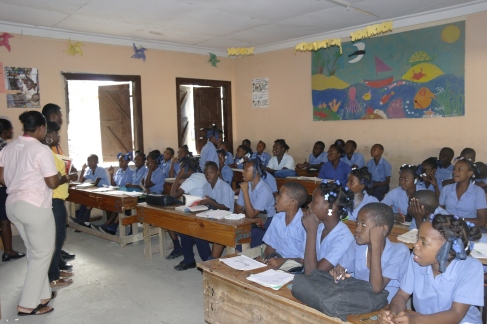 Mama Sia continues to provide wonders en masse at the office kitchen, always with plenty of rice (and beans), served up with a delightful cheer and the response “je t’en prie ma cherie” – my pleasure, darling, to a thankyou from a hungry Plan employee!
Mama Sia continues to provide wonders en masse at the office kitchen, always with plenty of rice (and beans), served up with a delightful cheer and the response “je t’en prie ma cherie” – my pleasure, darling, to a thankyou from a hungry Plan employee!
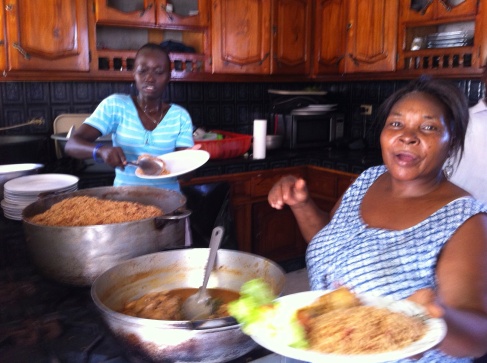 Mama Sia (right); Beans and rice and spiced chicken stew
Mama Sia (right); Beans and rice and spiced chicken stew
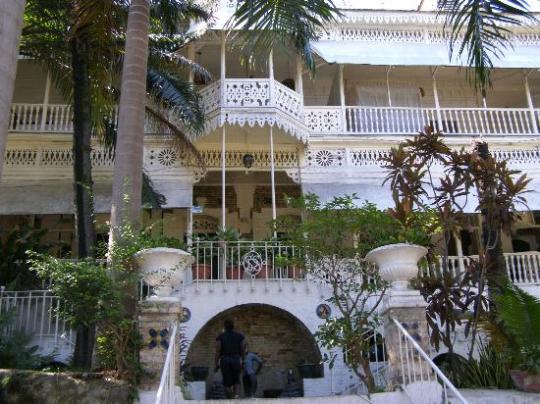
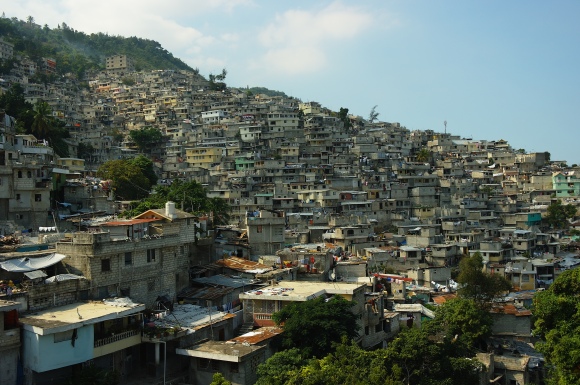
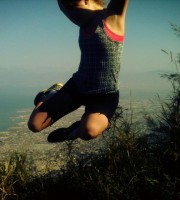
 Grand Taptap: Victoire au nom de Jesus – victory in the name of Jesus
Grand Taptap: Victoire au nom de Jesus – victory in the name of Jesus The mountains behind Port au Prince are spectacular. The country is largely mountainous, the highest peaks reaching around 2000km. Affectionately named ‘La Swisse d’Haïti’ (The Switzerland of Haiti), the view certainly does resemble the European Alps. The weekend before last I had the privilege to be taken beyond the sprawl of the city to a rural picnic with some friends I have met through a wine and cheese book club. Every Friday I go to ‘T wine’ (petit wine, in Creole) in a quaint little library at the Petionville Club: another establishment failing to mask it’s nostalgia, but with such character the likes of which could fill a Graham Green novel (both the people and the place!). 30 or so of us drove the 2 and a bit hours up the winding track (which looked more like a river bed at times!) to spectacular views and cooler weather. Sadly, upon close inspection, a melancholic hue exuded itself as the devastating environmental impacts of a land poorly managed for nearly 200 years became apparent. The steep valleys and ridges are stripped bare of the once large pines and tropical jungles as they were deforested for use (as continue to be) as fuel. There are naked swathes of earth where land slides occur on the unprotected soil after high rainfall. Underfed live stock are few and far between, and the legumes and grains produced do not nearly support Haiti’s 8 million inhabitants.
The mountains behind Port au Prince are spectacular. The country is largely mountainous, the highest peaks reaching around 2000km. Affectionately named ‘La Swisse d’Haïti’ (The Switzerland of Haiti), the view certainly does resemble the European Alps. The weekend before last I had the privilege to be taken beyond the sprawl of the city to a rural picnic with some friends I have met through a wine and cheese book club. Every Friday I go to ‘T wine’ (petit wine, in Creole) in a quaint little library at the Petionville Club: another establishment failing to mask it’s nostalgia, but with such character the likes of which could fill a Graham Green novel (both the people and the place!). 30 or so of us drove the 2 and a bit hours up the winding track (which looked more like a river bed at times!) to spectacular views and cooler weather. Sadly, upon close inspection, a melancholic hue exuded itself as the devastating environmental impacts of a land poorly managed for nearly 200 years became apparent. The steep valleys and ridges are stripped bare of the once large pines and tropical jungles as they were deforested for use (as continue to be) as fuel. There are naked swathes of earth where land slides occur on the unprotected soil after high rainfall. Underfed live stock are few and far between, and the legumes and grains produced do not nearly support Haiti’s 8 million inhabitants.
 The past two weeks at work have been busy. We have finalised the dates for our training days for our staff in all of the offices which will take place in January and February. The training days are interactive sessions for all members of the office staff and provide a valuable service to the community through the trickle down effect of their teachings. Last week I attended a Child Protection Training seminar for two days which was a valuable insight into how the sessions run and the extent to which staff are familiar with Plan’s Human Rights focused Development work. It was certainly an eye opener when the instructor was asked to explain to one olderman what a condom was and it’s use. Gender Stereotyping will certainly be an interesting topic for our training – with no doubt many heated discussions to come! A dose of cultural relativism helped when I laughed to myself at the instructor’s need to use a whistle to diffuse the vehement group discussions in response to oen of his questions! A sports whistle is on my shopping list!
The past two weeks at work have been busy. We have finalised the dates for our training days for our staff in all of the offices which will take place in January and February. The training days are interactive sessions for all members of the office staff and provide a valuable service to the community through the trickle down effect of their teachings. Last week I attended a Child Protection Training seminar for two days which was a valuable insight into how the sessions run and the extent to which staff are familiar with Plan’s Human Rights focused Development work. It was certainly an eye opener when the instructor was asked to explain to one olderman what a condom was and it’s use. Gender Stereotyping will certainly be an interesting topic for our training – with no doubt many heated discussions to come! A dose of cultural relativism helped when I laughed to myself at the instructor’s need to use a whistle to diffuse the vehement group discussions in response to oen of his questions! A sports whistle is on my shopping list!
